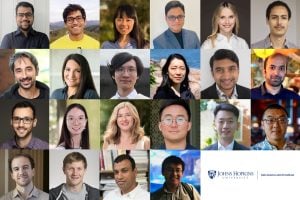
The Johns Hopkins Data Science and AI Institute welcomes 22 new faculty members. These newly appointed faculty members join more than 150 Data Science and AI Institute faculty members across Johns Hopkins in advancing the study of data science, machine learning, and artificial intelligence and translation to a range of critical and emerging fields.
The hires are part of the university’s latest unprecedented investment in data science and AI-related faculty and doctoral students.
Anand Bhattad, assistant professor in the Department of Computer Science. Bhattad’s research spans computer vision, computer graphics, generative modeling, and physical reasoning.
Uthsav Chitra, assistant professor in the Department of Computer Science. Chitra’s research broadly develops machine learning methods for analyzing high-dimensional and multimodal biological data, with a focus on understanding the organization and dynamics of genes, proteins, and cells in healthy and diseased settings.
Zih-Yun (Sarah) Chiu, assistant professor in the Department of Computer Science. Chiu’s research goal is to develop the next generation of intelligent robots that can see, plan, move, and learn with the expertise of skilled medical professionals.
Kamal Choudhary, assistant professor Materials Science and Engineering and Electrical and Computer Engineering. His research focuses on atomistic materials design using classical mechanics, quantum mechanics, and machine learning methods to accelerate experimental discovery.
Kristina Gligoric, assistant professor in the Department of Computer Science. Gligoric’s research focuses on developing and applying large language model methods to understand, simulate, and change human behavior, with an emphasis on diet and health.
Alden Green, assistant professor in the Department of Applied Mathematics and Statistics. Green works on problems related to high-dimensional regression, dimensionality reduction, graph-based nonparametric estimation and hypothesis testing, and selective inference.
Soufiane Hayou, assistant professor in the Department of Applied Mathematics and Statistics. Hayou’s research sits at the intersection of theory and application in modern machine learning.
Murat Kocaoglu, assistant professor in the Department of Computer Science. Kocaoglu is interested in developing new theoretical results that provide insights about fundamental causal discovery and inference problems, and developing novel algorithms based on these insights with a wide range of applications, from computer security and machine learning to generative AI.
Tim Kunisky, assistant professor in the Department of Applied Mathematics and Statistics. Kunisky studies how probability and statistics work together to solve problems using computers and how the computers follow instructions.
Ziyang Li, assistant professor in the Department of Computer Science. Li’s research lies at the intersection of programming languages and machine learning, with additional contributions in security and software engineering.
Peirong Liu, assistant professor in the Department of Electrical and Computer Engineering. Liu’s research focuses on AI for healthcare at an intersection of machine learning, computer vision, and medical image computing, aiming to advance foundational theories of learning and representation, to establish general frameworks that support complex real-world healthcare systems.
Chinmay Maheshwari, assistant professor Electrical and Computer Engineering. Chinmay’s research focuses on developing novel theoretical and algorithmic frameworks to design and analyze interactions between strategic autonomous agents and humans in societal cyber-physical systems, including mobility (air and road), multi-robot systems, and energy networks.
Krishna Murthy Jatavallabhula, assistant professor in the Department of Computer Science. Murthy Jatavallabhula’s research focuses on building full-stack robotic systems that can perceive, reason, and act in the real world.
Tiziano Piccardi, assistant professor in the Department of Computer Science. Piccardi’s research focuses on social computing, artificial intelligence, and web research, with the goal of improving the design of online platforms—including social media, open knowledge platforms like Wikipedia, and user-facing AI systems.
Laixi Shi, assistant professor in the Department of Electrical and Computer Engineering. Shi’s research focuses on robust and data-efficient reinforcement learning at the intersection of data science, optimization, and statistics.
Berrak Sisman, assistant professor in the Department of Electrical and Computer Engineering. Sisman develops neural models for speech information processing, including the study of emotion and expressiveness in speech.
Anuj Srivastava, professor in the Department of Applied Mathematics and Statistics. Srivastava’s research lies in the use of geometry and statistics in advancing inferences related to complex objects.
Yu Sun, assistant professor in the Department of Electrical and Computer Engineering. Sun integrates machine learning and other techniques to create frameworks to incorporate AI into imaging systems to unlock new capabilities that can surpass traditional methods.
Ziyun (Claude) Wang, assistant professor in the Department of Electrical and Computer Engineering. Wang’s research focuses on enabling intelligent robotic systems capable of perceiving, understanding, and interacting with complex and dynamic environments.
Chaowei Xiao, assistant professor in the Department of Electrical and Computer Engineering. Xiao aims to study from both model and system perspectives to secure AI systems with both practical robustness and provable guarantee as well as exploring their roles in real-world applications.
Yaxing Yao, assistant professor in the Department of Computer Science. Yao’s research lies at the intersection of human-computer interaction (HCI), privacy and security, and AI, covering various technological contexts (such as AI, embodied AI agents, and online privacy) and user groups, including at-risk populations like people with disabilities, children, and teenagers.
Lydia Zakynthinou, assistant professor in the Department of Computer Science. Zakynthinou works on the theoretical foundations of trustworthy and reliable machine learning and statistics.


